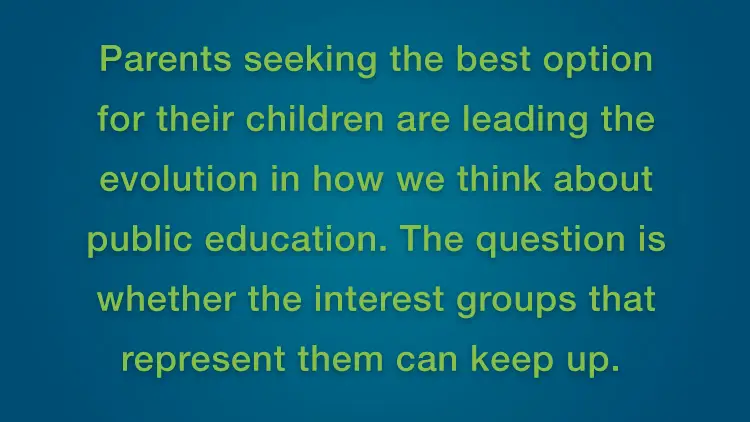The NAACP’s resolution to oppose charter schools left thousands of black families whose children attend charter schools stunned. How could such a revered institution fail to recognize their beliefs and interests?
Organizations like NAACP have earned our trust and respect. Decades of fighting on behalf of the powerless have given them good standing among politicians, media, and our next door neighbors. But they are not infallible. They are, like all organizations, political. A small number of organized and involved individuals can drive positions and agendas. They are also likely to favor allegiances of the past. Friends and belief structures that were central to the organization’s founding fights can prevent smart solutions to today’s problems.

I don’t know enough about the decision-making process on NAACP’s charter resolution to say how much politics or misinformation were at play, but black charter school parents from across the country drove and flew to Cincinnati only to feel shut out of the process and upset that an organization they respect has disregarded their interests.
I know what it’s like to be stuck in a school, desperate for options, when organizations supposedly representing my child’s interests oppose those very options. In my case, it was the disability advocacy groups who actively opposed charter schools as well as “specialized schools” designed to serve particular disabilities like autism. Much of this opposition goes back decades to critical legal battles that opened up access to general education classes for students with disabilities who had previously been excluded from them. Now the organizations that fought these legal battles are inflexible, and will oppose specialized schools even when designed to benefit students with disabilities.
For parents, being given the option of a specialized school that is better equipped to serve their child’s unique needs is very different than being forced into a specialized program. Something like that is obviously true of black students in charter schools. They also appreciate what advocacy groups have done to end discriminatory segregation. But, they also want to be able to choose the school that works best for their child.
School choice introduces a fundamentally new dynamic into the concept of inclusion. Parents would not want to go back to a system built on unequal access to schools, but they don’t want to be denied options in the interest of maintaining quotas or forcing all children in a neighborhood to attend the same school whether it meets their needs or not. Abuses are possible in any situation, but the remedy is transparency and determined action in particular cases, not blanket prohibition.
For advocacy organizations like the NAACP and those representing students with disabilities, addressing the challenges thoughtfully is far more effective than political posturing that closes down much-needed options. Group leaders need to invite member debate and dialogue so they can effectively advocate for the least vocal members. A group I’m honored to serve on, the Equity Coalition, embodies this concept. Disability and charter leaders now meet regularly with researchers and legal experts to understand facts and work on solutions together to ensure that charter schools effectively serve all students with special needs.
Revered national institutions like the NAACP need to make sure they don’t put their coalitions with teachers unions and others above the interests of parents and children. As one NAACP member recently lamented, “Black parents, I am sorry that you will have to listen to non-black people quote the NAACP to you as they basically tell you that you do not have the right to choose what you feel is best for your children. It bothers me to the core.”
Ironically, it is the debate about another institution—public education—that is leading to all this turmoil. Our definition of public education is evolving: the goals —equitable, excellent, and publically accountable tuition-free schooling—are becoming more important than who has traditionally run schools. All institutions, whether they are school districts, individual charter schools, charter management organizations, or state agencies, can serve students well or badly. Only empowered and informed parents, responsible and transparent government oversight, and vigilant and powerful advocates can keep schools pointed toward excellence.
The resolution was passed last Saturday at the NAACP national board meeting in Cincinnati, but the issue is not going to go away. Because charter schools are here and will continue to grow, it’s vitally important to bring together both sides. The NAACP can pull together working groups with black families and researchers to build knowledge and ideas. They could send a strong message by saying they will deeply engage in this way for a year and then revisit their decision.
As we say at CRPE, public education is a goal, not a particular set of institutions. Parents seeking the best option for their children are leading the evolution in how we think about public education. The question is whether the interest groups that represent them can keep up.



